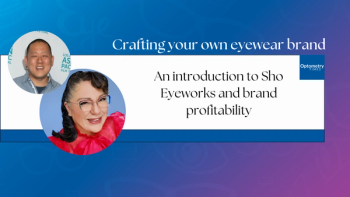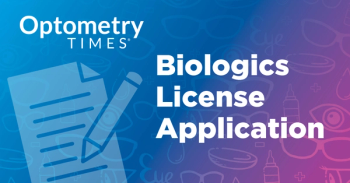
Q&A: Jeffrey Sonsino, OD, FAAO
I have very simple advice for students who are finishing up or new grads: figure out what you want to do. If your goal is to get out to work for a big box store or in a commercial setting, then go into that right when you’re done.
Where did you grow up?
I grew up in a suburb of Philadelphia right on the edge of Valley Forge National Park. We used to dig up our back yard to find little Revolutionary War trinkets.
When did you get interested in optometry?
I had a really good optometrist growing up. We went to the optometrist faithfully every year, and the guy who did my eye examination was just awesome. I just wanted to be like that guy. He had this cool equipment, he was so nice, we would laugh, we would joke. I said, “That’s what I want to do when I grow up.”
Why contact lenses?
I finished optometry school, and I was trying to figure out what I wanted to do. I knew I wanted to do a residency because I knew it would give another level of training you could never replace any other time in your career. At the time I was trying to decide whether I should do a cornea/contact lens residency, or if I should do an ocular disease residency within the VA. The idea of contact lenses appealed to me because I knew less about them than any of the ocular diseases I had studied in school. It irked me that I didn’t know about something. It turned out to be a good move.
What brought you from academia to private practice vs. moving into industry?
My first job out of residency was at Vanderbilt Medical Center in Nashville. For 11 years, I worked in the department of ophthalmology. I came up with nine patents, all in vision-related fields. Vanderbilt had a wonderful mechanism for taking ideas out of doctors’ heads and putting them into patents, but there was no way to commercialize this stuff. The university spent a bunch of money on this, and then a lot of them didn’t go anywhere. So, I realized that phase of my life was over. I wanted to take this stuff that I had come up with and bring it to market so we could actually help people. One company said, “Hey, we like the way you think, we want you to come work for us.” You know what, I’m just not that interested in leaving clinical practice, it’s really what I love to do. I love seeing patients; I really didn’t want to get into the corporate world. My wife, eight years prior to my making the decision to leave academic medicine, had started a little boutique optical around the corner from Vanderbilt. So, I decided to leave academia, and I went into private practice with her.
What keeps you involved in clinical research?
I think the clinical research is what makes a practice. Being on top of the new stuff before it hits market is what my patients have come to expect. My patients know that every single year there’s going to be something new, and I’m going to approach them to say, “Hey, we’ve got something new. Would you be interested in trying it?” The reason they’re coming to me is not so they can be put in their Acuvue 2 year after year after year. They reason they’re coming to me because we’re always pressing the limits of what’s possible and trying for something that’s better. At any one time, I’m running three or four studies for companies, and then we run clinical studies that are investigator initiated as well. So we have a huge clinical research enterprise that deals both with companies and ideas that come out my staff or my head.
You joined your wife’s practice. What are the plusses and minuses of working together?
I get asked that question a lot. I’ll tell you the major minus against doing it: Models have a characteristic that they have a really large pupillary distance. And my wife-every time I go to sit behind the damned slit lamp, I have to take her massive pupillary distance and shrink it down to my Cro-Magnon pupillary distance [laughs]. Every time I go behind the slit lamp, I have to change it. That’s the major minus. We’re loving life. She and I are completely aligned. We have the same goal in mind-we want to have a fantastic work/life balance. Work/life balance is a hundred times more important than money. We would rather work less, travel more, and make less money. Us being completely aligned like that makes our lives very easy. She’s a detail oriented person, I am a long-range planner. So we complement each other’s strengths extremely well.
What’s something your colleagues don’t know about you?
I’m a competitive sailboat racer. Back to that work/life balance, every Wednesday evening I’m on the race course at the lake, sailing. I just didn’t have the time to do that when I was in an academic medical center and employed. My father taught me to sail when I was 4 years old. When I got to Nashville, I realized there was a rich sailboat racing community. I just showed up one day and said, “Hey, can I crew?” They just took me in and for about 15 years I’ve been sailboat racing.
What inspired low vision reading glasses that combine magnification, prism correction, and LED lighting?
I ran the Low Vision Center at Vanderbilt, and after seeing patient after patient after patient with similar needs, I went to the Internet to find what I needed, which was high-powered, prismatic readers, but with lights. I could find prismatic readers, and there were very good companies that made them, but nobody made them with lights. So I was forced to have patients wear a hiking or spelunking headlamp when they used their readers. It was a great idea, and it worked when they were in the chair, but nobody did it. People need things that are simple that they don’t have to think about. All they do is put them on their head just like a pair of glasses. Nobody had patented it, so we patented the idea of high-power prism and lights, and it turned out to be a very robust patent. Everything with the low vision patient in mind was put into the design of these glasses. An example is something as simple as when you open the temple, the lights come on automatically. There’s a lock and key structure to the temple so those lights never come out of alignment. They’re selling very well.
Are you thinking about other avenues for niche vision products?
I’m continuing to work on a bunch of ideas I came up with at Vanderbilt and beyond. Now having a bit more latitude to work with some of the companies, I’m working directly with them to develop products to bring to market. So, in the coming years, you’ll probably hear of some things coming out of our practice and our laboratory.
What three things you would advise a young OD grad?
I have very simple advice for students who are finishing up or new grads: figure out what you want to do. If your goal is to get out to work for a big box store or in a commercial setting, then go into that right when you’re done. Your life is going to be simple. But if your interest is being in the leadership of optometry, developing new things to help the profession, doing something to instigate change within our profession, or doing something on the grand scale with patients, you’ve got to get the top training in whatever area you decide to go into. The answer to that is do a residency. You’re going to surround yourself with the people who are already doing that. The best way to achieve success is to surround yourself with successful people. The residency was the best move I made in my career because it gave me a bit of confidence to deal with the clinical aspects and gave me the connections within the industry to make stuff happen. That’s what it’s all about.
If you could do it all over again, what would you change?
Honestly, I’m loving life. I don’t know that I would change anything. I have a great family. I have a great practice. I have great industry contacts. I have great patients, the kind of patients I want to see. The only thing I would do differently if I had a time machine is, man, I would love to talk to some of these medical and vision insurers and try to figure out what’s in their heads. I’d try to change their behavior because there are some things that they do that are just flat-out wrong and not in the interest of patients or doctors. Really, the only thing that causes me grief are these insurance companies.
What technical innovations in contact lenses are on the horizon?
The landscape of intelligent contact lenses that do things other than correct vision is going to be huge in the next 10 years. There’s a bunch of stuff that I can’t talk about that’s really exciting me. But the stuff that’s out there that’s been announced is coming: putting microelectronics in contact lenses, using contact lenses as drug delivery devices, and then improving the safety profile of contact lenses using technology. I’ve geared my practice making sure that we are up on technology. The stuff that’s coming in the pipeline from companies, startups, and Kickstarter groups is just out of control. It’s what’s fun about this profession. The things that were in Star Trek are coming to fruition in our lives every day, and the same goes for optometry and contact lenses.
What’s the craziest thing you have ever done?
I took my son on a hike in the tallest mountain in the Smokey Mountains, and our grand plan was to meet my wife and my daughter up at the top where you could drive up to an observation point. We were going have a sunset dinner. There was no cell phone communication. This hike was hard, it was a lot harder than we thought, and we were not making great progress-dense fog, we couldn’t even see our feet, we saw bear scat on the trail, and it was pitch black and raining. So we get to the top, and we hear some rustling in the bushes. I’ll tell you, he has never grabbed my hand so tight. I yelled out, “Hello!” I got no response, and he looked at me with the widest eyes. So, I yelled out again, “Hello!” And then all of a sudden, I hear, “Herr-ro!” A bunch of Japanese tourists doing the same thing we were doing. [Laughs] We walked down to the parking lot with them, and my wife was not there. So, my son and I rode with these complete strangers down to the parking lot where we started from. My wife had been driving back and forth trying to find us for an hour. I thought there were going to be helicopters out searching for us.
Newsletter
Want more insights like this? Subscribe to Optometry Times and get clinical pearls and practice tips delivered straight to your inbox.













































